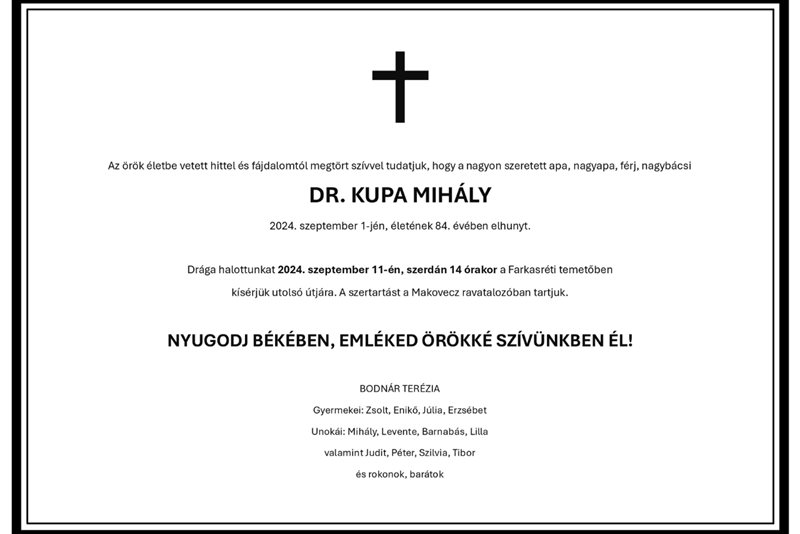Mihály Kupa passed away
_20240903041401.jpg)
Mihály Kupa was born in Budapest on 3 April 1941. In 1958 he was sentenced to 10 months in prison on charges of conspiracy. Between 1959 and 1969 he worked at the Chinoin Pharmaceutical Factory, and from 1965 he was head of the experimental plant of the Microbiology Laboratory. In the meantime, he graduated from the correspondence course and completed an evening course in theoretical economics at the Marx Károly University of Economics (predecessor of Corvinus). He obtained his doctorate in 1975.
Between 1969 and 1975 he worked at the Central Statistical Office (KSH), where he was responsible for infrastructure and financial statistics. From 1975 he worked at the Institute for Financial Research and from 1984 at the Ministry of Finance, where he was involved in financial policy, tax policy and public finance reform.
In 1990, he became head of the Budapest office of DRT Hungary, one of the world’s largest financial consultancies, and worked as an advisor to the then Minister of Finance, Ferenc Rabár.
He was successor to Ferenc Rabár as Minister of Finance from 20 December 1990 to 11 February 1993. In this capacity, he was Chairman of the Cabinet for Economic Affairs of the Government, Vice-Chairman of the Board of Governors of the European Bank for Reconstruction and Development (EBRD), and Chairman of the General Assembly of the International Monetary Fund (IMF) and the World Bank.
In 1991, he stood in a parliamentary by-election with the support of the Hungarian Democratic Forum (MDF) in the 11th single-member constituency of Borsod-Abaúj-Zemplén County, and after his election he joined the MDF parliamentary group. In 1993 he left the MDF parliamentary group and worked as an independent MP until the end of his term. In 1994, he stood for Parliament as an independent candidate but did not win a seat. He successfully stood as an independent candidate in Szerenc in the 1998 parliamentary elections and was a Member of Parliament until 2002.
From 2001 to 2007 he was President of the Centrum Party, which he founded.
From 1993 he was an associate professor at the University of Economics in Budapest. In 1980 he published a book entitled Income Distribution, Budgeting, Economic Processes and in 1987 he was the editor of a work entitled Personal Income Tax in Hungary.
He was awarded the 1956 Memorial Medal in 1991, the Farkas Heller Prize in 2003 and the Twenty Years of the Republic Prize in 2009.
In 2018, he became a member of the Board of Trustees of the Hungarian Multiple Sclerosis Foundation.

Source MTI.hu
Photo: Fortepan / Zoltán Szalay